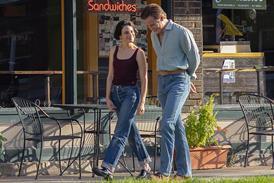Dir: Pablo Trapero. Argentina 2002. 92mins.
The Buenos Aires police department comes under wry satirical scrutiny in the second feature by the director of the highly-acclaimed Mondo Grua (Crane World). The business of crime-fighting has rarely looked so farcically disreputable outside the Police Academy series, but the humour here is much darker and more cynical. Trapero's gritty drama about police corruption is a narratively taut, highly atmospheric piece that could prove highly saleable on the specialist circuit. It will certainly further his reputation as a distinctive, tough-minded auteur to watch, and will win him as many friends on the festival circuit as it will no doubt make him enemies among Buenos Aires's finest.
Trapero's anti-hero (Jorge Roman) is hulking, taciturn Zapa, a 35-year-old locksmith from the sticks. His seedy boss Polaco (Hugo Antanuzzi) sends him to help robbers crack a safe, and the easy-going Zapa ends up taking the rap while Polaco vanishes. His well-meaning ex-cop uncle pulls some strings, and Zapa ends up heading for the big city, where irony of ironies he's enlisted into 'El Bonaerense', the notoriously corrupt Buenos Aires police force. "God help you," says the enlisting officer, and we soon see why.
Starting out as a clerk, Zapa is soon sent on basic training under a tough sergeant, and takes his place in a classroom where all the rookies act like unruly schoolkids. Zapa quickly gets the hots for Mabel, one of his training officers (Mimi Arduh), and starts a torrid affair with her, to the rage of the last cadet in Mabel's life. Coming under the protection of new commissioner Gallo (Dario Levy), Zapa starts rising through the ranks and getting a first-hand experience of police corruption. The force is a ramshackle, venal organisation where backhanders are routine, and where aspiring cops are encouraged to pay their own money for uniforms and guns. Zapa's career seems set on a smooth path, until old boss Polaco turns up and tries to enlist him for another job.
Zapa's story follows a fairly predictable route, and many of the ironies are of the sort that can be seen coming a mile off: it is so obvious, for example, that the straight-arrow officer who gives his men a lecture on morals will turn out to be the most crooked of the lot. But this is in no way works to the film's disadvantage. Trapero's great achievement is to give us a sense of the everyday grind of Zapa's life, underlining the way he falls into corruption through pure weakness of spirit and just plain inertia. The tone is a compelling mix of hard-edged drama and farce, with adults acting like squabbling, slobbish boys and being castigated by schoolteacher-like officers. Jorge Roman has impressive presence as the proverbial man-who-isn't-there, while his Zapa is a brooding, overgrown adolescent to whom it doesn't much matter which side of the law he's on. Mimi Arduh also makes an impression as the tough female officer and single mother who's seen it all, who disapproves of Zapa's corruption but isn't so by-the-book that she won't sleep with her subordinates.
The film is shot by Guillermo Nieto in rough, grainy stock, with emphasis on yellows and greens that creates a grubby, steamy, oppressive atmosphere, at once sleepy and tinderbox-tense. The gently downbeat ending suggests that the rot is too deeply entrenched for anything to change overnight. What's impressive is that Trapero gets his dark conclusion across with considerable tenderness. A definite narrative and stylistic consolidation on the promise of Trapero's debut, El Bonaerense is a more than encouraging sign for the survival of Argentina's renascent cinema, political crisis notwithstanding.
Prod co: Pablo Trapero
Int'l sales: Wild Bunch
Scr: Pablo Trapero
Cinematography: Guillermo Nieto
Ed: Nicolas Goldbart
Prod des: Sebastian Roses
Main cast: Jorge Roman, Dario Levy, Mimi Arduh, Hugo Anganuzzi, Victor Hugo Carrizo

















No comments yet